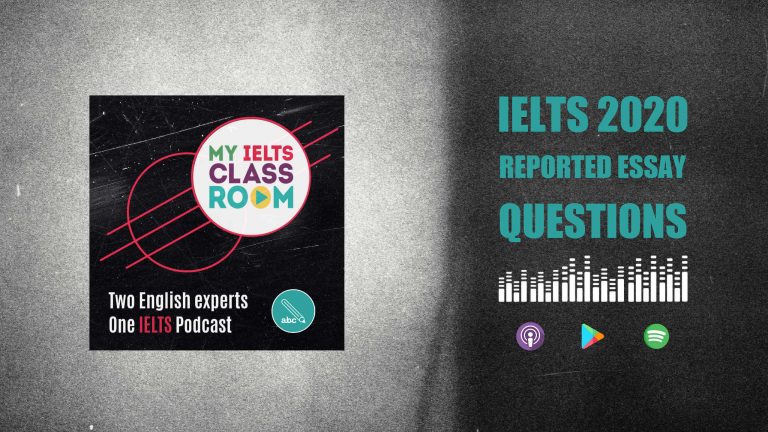
Five IELTS 2020 essay questions explained
Hey! In today’s episode Nick and I look at five recently reported essay questions from the 2020 Academic and General Training IELTS tests. Obviously, we cannot be 100% sure that the wording of these questions is totally accurate, but they are based on the information provided to me by my students (who I trust with my life). Even though it is very unlikely that you will have exactly the same questions in your test, hopefully by the end of today’s lesson you will have a much better understanding of how to analyse questions and decide how to approach them. After all, IELTS 2020 essay questions can be on almost ANY topic!
Below, you can find a summary of the episode. This includes all of the links to useful materials and the times of each part of the discussion (so you can go directly to the part you want to listen to).You can also find every episode of the podcast here 🚀
Subscribe to My IELTS Classroom podcast on Apple podcasts here
Subscribe to My IELTS Classroom on Google podcasts here
Podcast Summary: Five recent IELTS 2020 essay questions explained
00:00 – 01:54 Introduction (Will Nick survive eating his backpack cheese?)
01:55 – 06:31 Why you should be very careful about using reported IELTS questions
I know that students are always very keen to practice using topics that have recently appeared in the real IELTS test. But this leads to a range of problems that at best mean that you are wasting your time and at worst can actively damage your IELTS preparation.
The problem is that it is almost impossible for students to accurately remember essay questions in the stress of the exam room. Yes, they may be able to remember the general topic (i.e. it was about paying for university) but it is extremely unlikely that they will be able to remember every word.
Why is this a problem? Well, it means that some reported questions make absolutely no sense. My “favourite” examples of this are reported Discuss Both Sides questions that ONLY HAVE ONE SIDE!!!
University education should be free. Discuss both sides and give your own opinion
Or reported questions that ask you to discuss both sides but do NOT ask for your opinion, which NEVER appear in IELTS!
Some people think university education should be free. Others feel that students should pay. Discuss both sides.
These are simple examples, but I can tell you that with almost 15 years’ experience working as a test designer, there are errors like this in almost every reported question that I see. Sadly, the most popular free IELTS preparation site is the place where this happens most – I am not sure why IELTS Liz encourages people to share the questions they had in the exam if she is not going to correct the badly-reported ones. If you use her site, BE CAREFUL!
I have a lot of respect for Liz and love that she provides a simple free overview of the exam for thousands of students, but try to avoid the page where students report questions – it can do you more harm than good.
The other problem is that even if the topic of the essay is remembered well, nine times out of ten, these reported questions contain grammar errors. It might be something small like a missing article, or big like the use of a gerund instead of an infinitive. But if you use that question, it is highly likely that you will also make that error somewhere in your essay, so all you are doing is reinforcing a mistake when you practice.
06:32 – 08:16 The 5 reported IELTS 2020 exam questions that we will look at today (that Shelly has edited to “work”!)
We are going to spend the rest of the episode looking at these 5 essay questions that were reported by my students earlier in the year. I have a blog post with another 50 recent exam questions, but I chose these because I believe that they are the most difficult.
In the episode, we will explain what it is about each question that makes it so tricky, and how you should approach them to ensure that you address the task properly. However, I strongly recommend that you spend 5 minutes planning each question before you listen to the rest of the episode. As you do, try to guess why I chose each one as a “tricky” question. Even better, email us to let us know which one you found the easiest and most difficult.
- 08:53 – 17:44 Some groups of people have benefited greatly from modern communication technology, but other groups have not benefited at all. To what extent do you agree or disagree?
- 17:45 – 22:44 University students should pay all the costs associated with their education because having a degree benefits them individually more than society as a whole. To what extent do you agree or disagree?
- 22:45 – 30:41 Shops should not be allowed to sell food and drinks that are scientifically proven to be bad for people’s health. To what extent do you agree or disagree?
- 30:42 – 35:40 Some people believe that having interviews is the best way to find new employees for a company. Others say that there are better alternative ways to appoint employees. Discuss both these views and give your own opinion.
- 35:41 – 46:05 In many places today, rapid lifestyle changes are affecting family relationships. Do the advantages of this trend outweigh the disadvantages?
I am not going to give you our ideas here or explain why each one was difficult – to find that out you are going to have to listen to the episode! However, in general, we discuss
- why tasks that look similar to old questions can trick students
- how it is important to consider every word in a task
- why some questions are easier to answer if you agree (or vice versa)
- why some questions are almost impossible if you just don’t have any ideas
- how some questions expect you to be able to define a term in order to answer them well
46:39 – END How many ideas should you come up with in the exam?
If you have a question that requires you to discuss two views, then you will need 4 main ideas in the test. If you are asked to only present your own opinion, you will need only 2. However, I always recommend that while you are practising, you try to come up with 3 ideas for each view. This will force you to practice the skill of critical thinking and increase your chances of coming up with good ideas in the exam.
Also, by considering each view equally, you may find that you change your position – remember, the best “opinion” is not the one that you hold in real life but the one you can argue for best in the test!
If you have a question that requires you to discuss two views, then you will need 4 ideas in the test. However, if you are asked to only present your own opinion, you need only 2.

Hopefully once you finish the episode, you will have a much better understanding of how to interpret questions correctly and how to make sure that you find ideas that 100% address them. If you still have problems generating ideas, then maybe go and read my how can you think of ideas for your essay post. This will help you understand the differences between the top down and bottom up approach. These can help trigger ideas for difficult questions.
If you enjoyed this lesson, you can find all of our live and video lessons on our main website www.myieltsclassroom.com, which is where you can also sign up for our IELTS essay correction service or book a 1-2-1 writing lesson with one of our IELTS experts. 🚀

